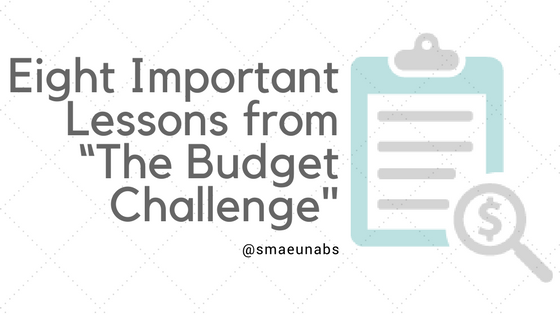Eight Lessons From “The Budget Challenge” Everyone Must Learn From
A personalized budget plan is a detailed summary of our earnings and expenditures for a certain period of time. Budgeting strategies may vary from one person to another depending on their personal financial responsibilities and capabilities, but one thing’s for sure, having a budget plan will aid us in reaching our financial goals in life.
#thebudgetchallenge I have initiated a week ago just concluded recently. If you haven’t read those budget plan entries yet, you can visit the summary here. I myself have learned so many things from that challenge, and I hope our fellow Steemians have learned a lot from such contest as well. These are the eight valuable lessons I believe everyone must learn from those budget plans:
.png)

If you haven’t created a budget plan yet, you can start by assessing your current financial state based on your historical income and expenditures. By doing this, you can contemplate on where your proceeds mostly go, and you will realize that most of your expenditures are reoccurring. Through that, you can make your own budget sheet while trying to make adjustments to the things that eat up most of your budget.
.jpg)
Paying yourself first doesn’t mean buying those Wants that you are craving for. Paying yourself first means you have to allocate savings and investments mainly before you start spending. Do something financially that your future self would thank for.
.jpg)
Don’t limit yourselves from following fixed plans just because everyone else is doing it. Try to make a flexible budget plan based on your own fixed and variable expenditures.
.jpg)
We should never take our careers for granted. We have studied so hard to attain the status we have now, thus, it best to invest in continuous education that could help us in developing ourselves as a person and as a professional. Start allocating a budget for self-improvement and career growth. Attending seminars and buying books are great ways to invest in your learnings.
.jpg)
Don’t create a budget plan just for the sake of having one. Be sure that the one you are making is attainable based on your current financial capability. Learn from other people’s budgeting principles, but not to the point of replicating it. You have to find a budgeting strategy that best fits your financial personality and capability.
.jpg)
Having a budget plan also means being well-versed with your Needs and Wants. Be conversant with the difference between the two. Needs are those things you can’t live without while Wants are those stuffs you can live without. It’s as simple as that. Some of the things that you want right now may don’t have any value for you in the future.
.jpg)
Some people may disagree on this, but having limitation doesn’t mean you’re being greedy. It means that you are disciplined enough to know your financial limitations.
.jpg)
This is one of the most valuable lessons our fellow Steemians must learn from. We must learn how to spend our Steemit earnings wisely! Take advantage of it and use it for creating multiple assets through investments.
I hope these lessons will help you to create a more effective budget plan. If you have an existing one already, try to revisit and reassess it. Is it attainable? Is it effective enough for you? If not, then consider incorporating the lessons above in modifying your budget plans.
“A goal without a plan is just a wish.”
Antoine de Saint-Exupery
The biggest challenge is not creating a budget plan nor having a budget principle, but the consistency of sticking with it.
Cheers to Financial Freedom!


this is really nice sis! I always make sure to keep track of my earnings and my expenses every cutoff. I always save first before spending anything unnecessary 😁
That's really good to hear sis! I am so glad to know a financially-responsible millenial like you :)
nice blog mam
Tahnk you so much po :)
Aabangan ko na po yung financial freedom book mo in a few years time :)
Yaaaay! Aabangan ko din yun kuya Erwin! Salamat <3333